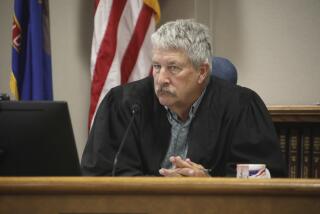North Dakota isn’t feeling the slump
- Share via
Reporting from Watford City, N.D. — If people anywhere in the nation should feel good about the economy, it’s those living in North Dakota, where an oil boom is creating so many jobs that even taco joints offer $15 an hour to attract employees.
Drawn by the promise of well-paying jobs, people from across the country flock here and settle in the makeshift clusters of RV campers and manufactured mobile homes that dot the outskirts of towns like this one, two hours south of the Canadian border.
The state of North Dakota has added 20,000 jobs over the last year, and its unemployment rate is the lowest in the nation, at 3.5%. Its budget has an estimated $1-billion surplus.
PHOTOS: Land of plenty in North Dakota
“I was told this is the only place in the country where there were jobs,” said Stephen Swaner, 29, who lives in a van with his girlfriend, her father and their dog and works 16-hour days, hoping to pay off debt he incurred after getting laid off two years ago from a job at a foundry in Spokane, Wash. “There’s all kinds of opportunity here.”
But even after finding a new life in this land of plenty, people say they’re still unhappy with the direction of the country and with politicians in general. The maxim “It’s the economy, stupid” doesn’t seem to hold true in North Dakota.
This state epitomizes a problem the Obama administration may face even if it is able to turn the economy around by 2012: People have suffered in this recession, and even when back on their feet, they have long memories of what they lost along the way.
Steve Williams, 59, moved his struggling construction company from Montana to Watford City, where he lives with his wife, son and two towheaded grandsons in a home he’s renovating in exchange for rent. He knows he has a lot to be thankful for: He has health insurance for the first time in decades, a steady job and a new life in a town he says is “America, the way it should be.”
“I have more work than I know what to do with,” said Williams, a slight man with a brown beard and glasses. “I look at it like the Gold Rush.”
But Williams is losing his $1-million home in Montana to foreclosure, and spent his first few months in North Dakota camped out in a tiny RV with his family, going to the bathroom in a bucket and living without running water.
“We’re starting over again at 60, and we’re adaptable. But our hopes and dreams got washed by the wayside,” he said, as he fed his grandsons carrots and potatoes in his kitchen, where he and his wife sleep on a foldout couch each night. Light bulbs hang from the ceiling near exposed sockets, and the yellow, peeling walls are stuffed with sacks of fiberglass for insulation.
Thousands of others like Williams have left their ambitions behind for the wind-swept prairie. The population of Watford City, which was 1,570 in the 2010 Census, has grown to more than 5,000. In the first quarter of the year, sales tax receipts were up 72% from the same time the previous year. Schools are fuller than they’ve been in decades.
North Dakota’s economy has soared since the discovery of the Bakken Shale, a deposit of oil that has proven both plentiful and relatively easy to extract. There are no signs of a slowdown in the fields: Research firm Raymond James predicts that production from the region will account for 15% of total domestic oil supply by 2015.
The oil boom is fueling growth throughout the economy. In Williston, a town 45 miles north of Watford City along a heavily traveled two-lane highway, hotels charge $200 a night for meager accommodations and are so overbooked that many newcomers sleep in their cars. Migrants post ads on Craigslist begging for rooming for less than $3,000 a month.
“Help wanted” signs are pasted on nearly every building: the local Jack & Jill supermarket, the Super 8 Hotel, the McDonald’s, Hardee’s and Taco John’s. Builders plan to thaw the ground with heaters so they can work through the winter to construct industrial parks for the companies they’re sure will come in the spring.
That doesn’t mean people in Watford City are content with the White House, said Mayor Brent Sanford, who owns the only car dealership in town. Though families finally have enough cash to upgrade their cars, they won’t buy Chevrolets, which he said they call “Obama Motors” because of the government’s bailout of the company. Newcomers are relieved to have jobs, he said, but are also frustrated at what they had to go through to find them.
“Their lives have been destroyed, they’ve lost homes and businesses, they’ve had to sell their cars for plane tickets to get here,” he said. “The desperation is just incredible.”
Local incumbents have also suffered. In 2010, voters ousted the state’s sole U.S. representative, a Democrat, in favor of a Republican. They replaced retiring U.S. Sen. Byron L. Dorgan, also a Democrat, with another Republican, the first time in a quarter-century the GOP seized both seats. The third member of the congressional delegation, Democratic Sen. Kent Conrad, has said he will not run for reelection in 2012.
The people who inhabit the endless rows of white trailers in the boomtowns hail from all sides of the political spectrum, but are now united in frustration.
“I would vote them all out. Things are wonderful here, but you have to look at the rest of the world,” said Alisha Fuston, who moved to Williston from Gainesville, Ga., with her husband, Adam, and their two children when he got a well-paying job as a pipe yard foreman. Back in Georgia, her husband worked in a chicken plant and barely made enough money to pay the bills.
Presidential candidates are canvassing Samuel Hicks’ home state of Iowa in advance of the caucuses, but the 31-year-old Hicks says he has other things to think about. He recently arrived in Williston to find all of the hotels booked and spent his first night camping by train tracks until police hustled him along. He then walked four miles to Wal-Mart, bought a tent, and set it up by a creek behind the place where he found a job on his second day in town. He’s had to weather gale-force winds and heavy rain, and has subsisted on beef jerky, Pop-Tarts and peanut butter.
Things are looking up now, and Hicks’ wife and three children are coming to join him soon, but that doesn’t mean he’s rushing home to vote.
“I probably wouldn’t vote for anyone,” said Hicks, who expects to earn $14,000 a year more cleaning oil drilling pipes in North Dakota than he did as a custodian in Iowa. “Our country is stagnant as far as the government goes.”
The straits of migrants from around the country so inspired Steve Monroe that he decided to write a ballad about his journey. Monroe, whose California concrete company went under after 23 years in business, spent a recent evening camped out in his RV in the parking lot of the Williston Wal-Mart, hoping not to be kicked out, as trucks, SUVs and beat-up cars hustled around on a windy night.
“The American dream still flourishes here on Highway 85,” he wrote. “Blue-collar pride may falter but it cannot be denied.... In a North Dakota badland summer trying to keep the dream alive … in a North Dakota badland summer trying to survive.”
PHOTOS: Land of plenty in North Dakota
More to Read
Sign up for Essential California
The most important California stories and recommendations in your inbox every morning.
You may occasionally receive promotional content from the Los Angeles Times.














